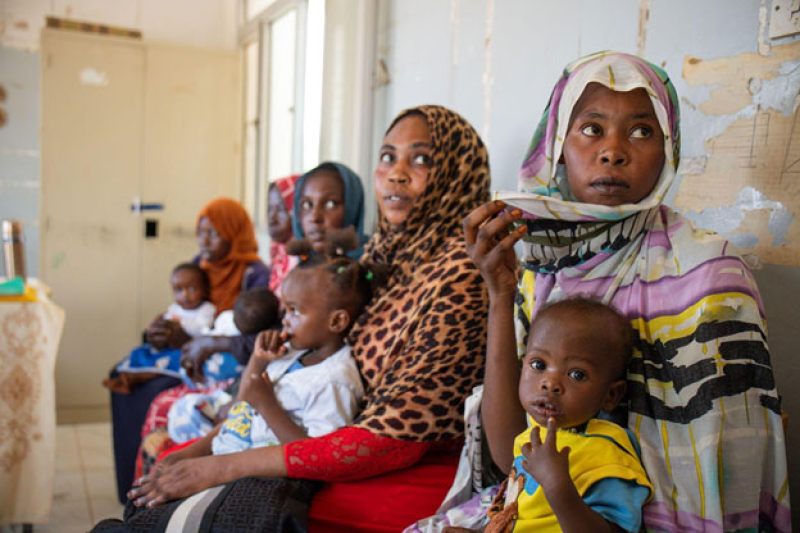- Logi-boitha of 2006 was the 1st reflection of Hasina’s fascism: Rizvi |
- Economists express concern over bank merger; BB remains confident |
- No response on request for Hasina’s extradition: Touhid Hossain |
- Deep relations with US, economic ties with China: Touhid |
- Recommendations on July Charter implementation submitted to CA |
UN Agencies Urge Immediate Aid as Sudan Faces Severe Crisis

This UNICEF-supported nutrition site focuses on delivering lifesaving interventions for the prevention and treatment of acute malnutrition among children under five and pregnant and lactating women.
Sudan’s humanitarian crisis has worsened significantly in recent weeks, with escalating hostilities, mass displacement, disease outbreaks, and a severe lack of access to essential services putting civilians at extreme risk. Attacks on healthcare facilities in October have further weakened the country’s fragile health system, depriving thousands of people of lifesaving care.
On 23 October, several United Nations (UN) agencies—including the International Organization for Migration (IOM), the UN High Commissioner for Refugees (UNHCR), UNICEF, and the World Food Programme (WFP)—issued a joint statement calling for urgent, coordinated international action. They reported that over 900 days of conflict and collapsing lifesaving services have “pushed millions to the brink of survival,” with women and children disproportionately affected.
“This is one of the worst protection crises we’ve seen in decades,” said Kelly T. Clements, UNHCR Deputy High Commissioner. “Millions are displaced inside and outside the country, with returning families receiving little support. I spoke with families fleeing El Fasher who had to leave everything behind, taking dangerous routes at great risk. Support is needed everywhere.”
An estimated 30 million people in Sudan urgently require humanitarian aid, including nearly 15 million children. Over 9.6 million people have fled their homes, making Sudan the world’s largest internal displacement crisis. Meanwhile, about 2.6 million have returned to active conflict zones, such as Khartoum, finding homes and livelihoods destroyed and essential services nearly absent.
Khartoum currently hosts nearly 900,000 refugees, while Tawila shelters over 600,000, many lacking adequate housing or protection. Aid groups have warned of rising anti-foreigner sentiment and stressed that protection assistance remains “lifesaving for hundreds of thousands” of displaced individuals facing violence and discrimination.
“This scale of return to Khartoum is both a sign of resilience and a warning,” said Ugochi Daniels, IOM Deputy Director General for Operations. “People are returning to a city scarred by conflict, with damaged homes and barely functioning basic services. Their determination is remarkable, but life remains fragile.”
Sudan’s education system has also been severely affected, with 14 out of 17 million school-aged children lacking access to schooling. Hunger remains critical, with famine confirmed last year in parts of the country. Children face high risks of malnutrition, and thousands are projected to be at “imminent risk of death” without nutritional support.
WFP Assistant Executive Director Valerie Guarnieri stated, “About 25 million people in Sudan, or half the population, face acute food insecurity. We have supported 4 million people recently, including 85% of those living in famine-risk areas. But we have reached the limits—not of our capacity, but of our resources.”
El Fasher has endured heightened insecurity for over 16 months, with 260,000 civilians, including roughly 130,000 children, trapped under siege without access to food, water, or healthcare. On 20 October, intense shelling displaced more than 109,000 people across 127 sites. UN reports also document extrajudicial killings, sexual violence, and forced recruitment.
October saw a surge in attacks on hospitals in Kordofan and Darfur states. On 5 October, the Rapid Support Forces (RSF) carried out drone strikes on hospitals in El Obeid City. Two days later, RSF artillery targeted the maternity ward of the Saudi Hospital for Women and Maternity in El Fasher, killing 13 civilians, including children, and injuring 16, including medical staff.
Sudanese families continue to face outbreaks of cholera, dengue, malaria, and measles, worsened by destroyed water systems and non-functional healthcare. In Tawila, North Darfur, over 6,000 infections and 11 deaths have been recorded since May, mostly in displacement shelters. South Darfur has reported 3,229 cases and 177 deaths since late August.
Ted Chaiban, UNICEF Deputy Executive Director, said, “Children face hunger, disease, and collapsing services. Entire communities survive in conditions that defy dignity. Families are doing everything they can, showing extraordinary resolve in unimaginable hardship.”
The 2025 Humanitarian Response Plan for Sudan calls for USD 4.2 billion but is severely underfunded, with only 25% secured. Aid groups have reached over 13.5 million people this year, including in Darfur, Khartoum, and Al Jazira. The UN stresses the need for continued cooperation and increased funding to prevent scaling back critical operations.
UN officials also called for development investments to rebuild essential infrastructure and services in health, sanitation, and energy. “Sudan urgently needs to rebuild and rehabilitate key infrastructure, restore public services, and support vulnerable returnees and IDPs,” Daniels said.
Clements added, “Development actors are needed now for reconstruction and rehabilitation, particularly in devastated areas like Khartoum, where more than a million people require basic services. Their role is crucial for helping people rebuild lives with dignity.”

